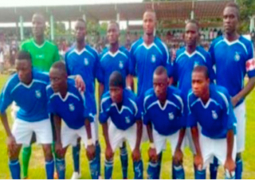THEME: "WOMEN
Good Evening
Fellow Gambians, Fellow women
International Women's Day, is celebrated, in many countries, around the world. You will recall, that this day, is celebrated, every year, on the 8th of March, with the objective, to highlight the achievements and challenges, in the promotion, of gender equality and the empowerment of women, at the national, and global levels. In The Gambia plans are on the way to celebrate International Women's Day, in April 2009, by the Women's Bureau, National Women's council and the Department of State for Women's Affairs.
This day, is when women, are recognized, for their achievements, without regard to divisions, whether national, ethnic, linguistic, economic or political. It is an occasion, for looking back, on past struggles and accomplishments, and more importantly, for looking ahead, to the untapped potentials, and opportunities, that await future generations, of women.
The global event, has grown from strength to strength, and has become an event, which brings women, and all other stakeholders, together, to promote and advocate, for a more cohesive and coordinated intervention, towards, effectively, addressing the strategic and/or critical needs of women in the social, political, and economic spheres and processes. Each year, a relevant theme, is identified, that is deemed most appropriate. This year's theme, is: "Women And Men, United, To End Violence Against Women And Girls".
Fellow Gambians, Fellow Women,
Violence against women and girls, is any act of gender-based violence, that results in, or is likely to result in, physical, sexual or psychological harm, or suffering, to women and girls, including threats, and such acts, as coercion, or arbitrary deprivation, of liberty, whether, occurring in public, or in private life.
In The Gambia, as in all other parts of the Globe we cannot overemphasize, the relevance and timeliness, of this year's theme, on Ending Violence, against Women and Girls, which focus, is given by the UN, and the AU, and their development partners. This theme, was the subject, of an ADF6 Forum, in Addis Ababa, Ethiopia, from the 19th - 21st November, 2008, jointly organized, by the Economic Commission for Africa (
In the
Fellow Gambians, Fellow Women,
In The Gambia, there is no available data on violence against women and girls, but some Gambian women and girls may have been either beaten, coerced, or otherwise abused, in their life time. Here in The Gambia like in all other parts of the World violence is present, and as a result, women, girls sometimes continue to suffer, in the home, and in the community, with devastating effects. The kind of violence, prevalent, in this country, although not exclusive to it, includes domestic violence, sexual violence, including rape, early and/or forced marriages, harmful traditional practices, and widow inheritance. Amidst all these violations, women are more at risk, of contracting STIS such as HIV/AIDS, than men, while feminisation of poverty, is perpetuated, and gender equality in some areas may remain unattainable, yet the culture of silence, prevails, especially, amongst female victims.
Fellow Gambians, Fellow women,
Many of the victims of rape, and other sexual violence, are usually deeply traumatized. Families and communities, often reject women and girls, who have been raped, and sexually assaulted, and usually strip, them of their social standing. In many cases, women who survive rape attacks, are subsequently disowned, by their families and husbands, leaving them even more vulnerable, to future attacks, because they lack the economic, social and physical protection.
Women and girls, subjected to violence, are more likely, to suffer physical, mental and reproductive health problems.
Incidence of sexually transmitted infections (STIs), including HIV/AIDS, I am informed is high among victims of violence.
Fellow Gambians, Fellow Women,
Some women and girls also suffer, from serious behavioural and psychological problems, sexual dysfunctioning and relationship problems, low self-esteem, depression, suicidal thoughts, deliberate self harm, and, in some instances alcohol and substance abuse. Their chances of acquiring skills, for socio-economic mobility, and independence, are, therefore, severely compromised.
Fellow Gambians, Fellow Women,
All too often, the physical and mental health services, necessary, for victims of violence, that is, women and girls, to help them, particularly resume normal lives, are not always available, especially, in rural areas. Perpetrators of rape and sexual violence, except the level of Government, often go unpunished by society. Few women are able to seek justice, against the perpetrators. It is common knowledge, to all Gambians, that testifying against alleged perpetrators, is often difficult for victims, due to the social stigma, attached to women and girls, who speak out, against their abusers especially if the latter are close family members. In this country, many women, choose not to testify, because they do not want, to bring further 'shame', to themselves, and their family. Witnesses, may also sometimes fear repercussions, from the perpetrators.
Fellow Gambians, Fellow Women,
If the culture of silence, amongst victims of violence ends, Government will hold perpetrators accountable, to their actions, for the Government of The Gambia, under the able leadership, of H.E. the President Professor Alhagie Dr. Yahya A.J.J. Jammeh, has never relaxed, its vigilance, in protecting, the dignity and welfare, of all Gambians including women and girls. When perpetrators of violence, are not held accountable, it not only encourages further abuses, but also gives the message, that violence is acceptable, and normal. This Government, will not condone this practice, and will do all it can, to prevent it - WE WILL BE
Cognizant of the incidence, of violence against women and girls, and its horrendous effects, on their fundamental rights and freedoms, and physical and mental health, the Government of the
Fellow Gambians, Fellow women
To harness comprehensive and systematic actions, to prevent and protect women and girls against violence, the following five (5) questions should be addressed:-
(1) What effective strategies, should be adopted, to promote and implement, the rule of law, against perpetrators of violence, and all forms of gender based violence?
(2) How should government and the society put an end, to impunity, and ensure accountability, with regard to violence exploying National Laws?
(3) How should the national financial policy be expanded, to include provisions for comprehensive support to victims of violence?
(4)What are some examples, of best practices, whereby gender-sensitive approaches, have been used, to include women and girls, in the design, implementation, monitoring and evaluation, of violence?
(5)What mechanisms, can be adopted, to advocate and mobilize popular support, to revive and promote, community-based outrage, and public outcry, against such acts of violence?
Fellow Gambians, Fellow Women,
The Government knows that it has a major duty and responsibility, to protect its citizens, against all forms of violence. Effective actions to prevent violence perpetrated by both Gender on Females. i.e. against women and girl children, require a comprehensive national approach, which should include preventive measures, punitive consequences, for perpetrators and protection of the victims, and their families' human rights.
As we celebrate, International Women's Day, may I kindly remind you that over the years, the Government of The Gambia, has systematically registered progress in the reduction of violence against women and girls. Women have now, more than ever before, been able to seek justice whenever, they fall victim of violence.
In conclusion, the national celebration, this year will, therefore, focus on ending violence against women and girls. The Government would continue to put in place or design appropriate legislative instruments and programmes to address all forms of violence against all in society, including women and girls. Government's efforts in this direction are made manifest by the several treaties and conventions it signed and ratified. This government has adopted several instruments to address the criminal acts of violence in addition to our National Laws, which include:- the charter of the United Nations 1945; The Universal Declaration of Human Rights 1948! Convention on the Elimination of All Forms of Discrimination against Women 1979; Convention on the Rights of Children 1989; The Protocol to the African Charter on Human and Peoples' Rights on the Rights of Women in Africa 2003 among others.
While wishing all a happy celebration in advance I thank you all and May Allah the Almighty bless us all men and women, young and old.



